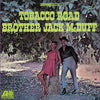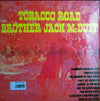



Brother Jack McDuff - Tobacco Road
Loyal J. Gresham (bass : A1, A2, A5), Robert Guthrie (drums : A1, A2, A5, B2), Roland Faulkner (guitar : A1, A2, A5, B2), Bobby Christian (Percussion, Vibraphone : A1, A2, A5, B2), Lonnie Simmons (Baritone Saxophone : A1, A2, A5, B2), Red Holloway (Tenor Saxophone : A1, A2, A5, B2), John Watson (Trombone : A1, A2, A5, B2), Fred Berry (Trumpet : A1, A2, A5, B1), King Kolax (Trumpet : A1, A2, A5, B1), Joe Dukes (Drums : A3, A4, B1, B3, B4), Calvin Green (Guitar : A3, A4, B3, B4), Danny Turner (Saxophone, Flute : A3, A4, B1, B3, B4)
Arranged by Jack McDuff (A3, A4, B1, B3, B4), conducted and arranged by J.J. Jackson (A1, A2, A5, B2)
Written by Rudolph Toombs (A1), John Loudermilk (A2), Johnny Mandel (A3), Paul Francis Webster (A3), Jack McDuff (A4, B4), Bob Dylan (A5), Johnny Mercer (B1), Ziggy Elman (B1), John Watson (B2), Irving Berlin (B3)
1 LP, gatefold sleeve
Original analog Master tape : YES
Heavy Press : 180g
Record color : black
Speed : 33 RPM
Size : 12'’
Stereo
Studio
Record Press : Pallas
Label : Speakers Corner
Original Label : Atlantic
Recording: August 1966 at Chess Studios, Chicago
Production: Lew Futterman
Originally released in 1967
Remastered by Kevin Gray
Reissued Jan 2019
Tracks :
Side A :
- Teardrops From My Eyes
- Tobacco Road
- The Shadow of Your Smile
- Can't Get Satisfied
- Blowin' In The Wind
Side B :
- And The Angels Sing
- This Bitter Earth
- Alexander's Ragtime Band
- Wade In The Water
Reviews :
« Brother Jack McDuff recorded an enormous number of albums during the '60s, so it can be difficult to figure out where to start digging a little deeper into his output (which Hammond B-3 fans will definitely want to do). 1967's Tobacco Road stands out from the pack for a couple of reasons. First, unlike many of his groove-centric albums, it's heavy on standards and pop/rock tunes (seven of nine cuts), which make for excellent matches with McDuff's highly melodic, piano-influenced style. What's more, about half of the album finds McDuff leading a large ten-piece ensemble arranged and conducted by J.J. Jackson, including a soulful horn section that sounds straight out of Memphis or Muscle Shoals (though this was recorded at Chess studios in Chicago). McDuff himself handles the arrangements on the rest of the material, which is done in a guitar/sax/drums quartet. The LP's style is fairly unified, though -- no matter what format, the tunes are given fantastically funked-up treatments that sound surprisingly natural. And these aren't grooves where everyone just settles back and stays in the pocket; McDuff attacks the arrangements with wildly funky rhythms and solos, and there's a polyrhythmic sense of interplay that recalls the best Southern soul. Arguably the most distinctive track is a cool, grooving quartet version of "The Shadow of Your Smile," complete with snaky bassline and airy flute solos from Danny Turner. Unfortunately, none of the tracks are all that long, in keeping with the jukebox/radio orientation of McDuff's Atlantic period, but that won't prevent soul-jazz fans from thoroughly enjoying Tobacco Road. » AllMusic Review by Steve Huey
"Imitation, assimilation, innovation." With these three words the great Clark Terry summed up the art of leaning musical improvisation. Salvador Dalí, the artist who melted time in his colourful and bizarre works, stated radically that a person who didn’t want to copy others would never manage to accomplish anything at all. Brother Jack McDuff did plenty of copying and refined the good old standards on his "Tobacco Road" and made them blossom anew.
Jack taught himself to play the organ and went on to transform the popular melody "Alexander’s Ragtime Band" into what one might call roughened up ball house jazz, were it not for the contrary saxophone, which soars over rasping organ clusters. For Brother Jack such spiritual sounds as in "And The Angels Sing" and his somewhat slanted version of the musing, dreamy "Wade In The Water" were an absolute must.
It really rocks in "Can’t Get Satisfied", a gospel-like and delicately instrumentalised version of the blues evergreen. The organ does not necessarily always have the last word in this colourful mixture, but it is always very present as regards the sound and the distribution of the parts. And just once does McDuff let the instrument sing out on its glassy top register in "The Shadow Of Your Smile".
Ratings :
Allmusic : 4 / 5 , Discogs : 4,15 / 5 , Rate Your Music :


